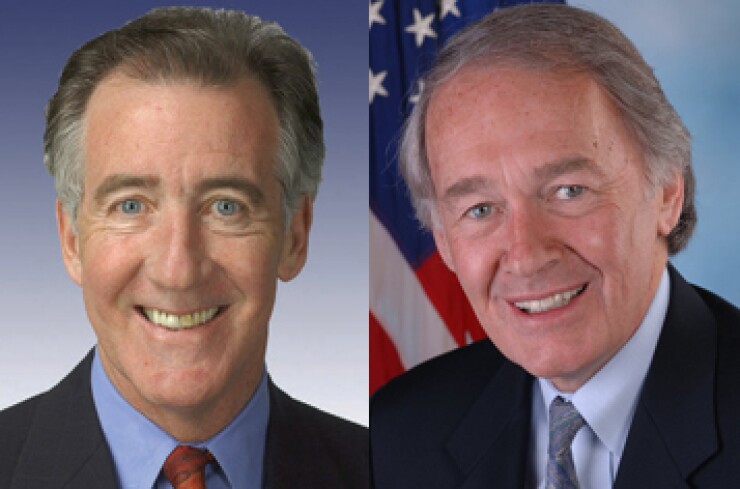
WASHINGTON —Rep. Richard Neal and Sen. Edward Markey, both Massachusetts Democrats, introduced identical bills Thursday that would permanently revive the Build America Bond program with lower subsidy rates and prevent issuers from being hurt by sequestration.
Under the bills - H.R. 2676, S. 1515: "Bolstering Our Nation's Deficient Structures Act of 2015" or "BONDS Act -- the subsidy rate for issuers would be 32% for BABs issued in calendar year 2015, lowered by 1% for bonds issued in each successive year, and remaining at 28% for BABs issued in 2019 and thereafter.
The BAB program, originally authorized by the American Recovery and Reinvestment Act, allowed state and local governments in 2009 and 2010 to issue taxable bonds and receive subsidy payments from the federal government equal to 35% of their interest costs.
From April 2009 through the end of 2010, more than $181 billion of BABs were issued. Massachusetts issued close to $5 billion of BABs, $3 billion of which benefited the Accelerated Bridge program, which repairs and rebuilds structurally deficient bridges in the commonwealth, according to a summary of the BONDS Act.
"During the Great Recession, when we were facing dire times, the Build America Bonds program was there to create jobs and economic opportunity," Neal said in a news release. "The surest way to jumpstart our economy is investing in our infrastructure. Programs like these put Americans back to work immediately and make long-term investments in our future by updating our schools, roads, bridges, and hospitals. I was proud to support the Build America Bonds program then, and I continue to support this highly successively program now."
The subsidy payments for BABs have been reduced since March 2013 as result of spending cuts known as sequestration. However, under Neal and Markey's legislation, issuers would not be hurt by sequestration cuts for any federal subsidy payments made after the date of enactment.
The legislation also would allow BABs to be current refunded with bonds for which issuers could also receive subsidy payments. In December, the Internal Revenue Service chief counsel's office issued a memorandum concluding that under current law, issuers are not eligible to receive subsidy payments for BABs that have been legally defeased.
The legislation is similar to bills measures Neal and Markey introduced during the last Congress.
The bills have been referred to the House Ways and Means Committee and the Senate Finance Committee. Neal is the top Democrat on the HWM committee's select revenue measures subcommittee and 10 Democrats on that panel have cosponsored the legislation.
Infrastructure financing is a major issue in Congress. Spending from the Highway Trust Fund, which reimburses states for surface transportation spending, is only authorized through the end of July, and the HTF is nearing insolvency.
Markey said he hopes his bill can be approved during Congress' transportation-funding debate.
"As the Senate debates passage of a long-term transportation bill, I look forward to working with my colleagues to get this important job-creating legislation passed," he said.
Fitch said that when BABs were issued in the past, they, "supported new public capital infrastructure projects, such as schools, bridges and hospitals, and had a very strong reception from both issuers and non-traditional municipal investors." The largest buyers of BABs included pension funds and foreign investors, which do not benefit from the tax-exemption for traditional municipal bonds, the rating agency said.
Almost half of all sovereign bonds had yields of less than 1% and nearly $5 trillion had negative yields at the end of April. Therefore, U.S. infrastructure debt "could be an increasingly important asset class for institutional investors searching for yield," Fitch said.
"The BAB-comparable AFFBs, or some variation thereof, could potentially offer investors higher yields with little additional issuer credit risk, while issuers would benefit from low borrowing costs via an interest subsidy, in this case proposed at 28%," the rating agency said. "This would allow issuers to select the optimal capital structure based on current market conditions and investor preferences rather than a 'one-size-fits-all' approach."





